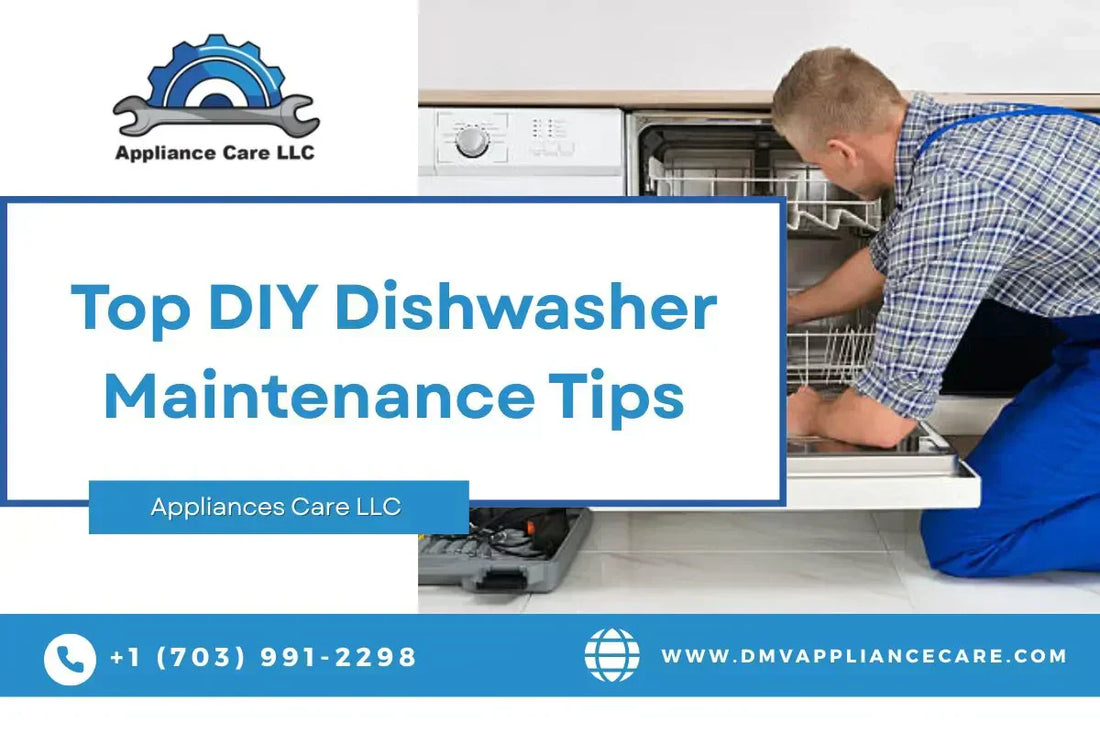Introduction:
Like other kitchen appliances, dishwashers also take importance in saving your time, water, and effort. But, like other machines, it also takes regular maintenance to work properly or to function well and longer. If you want your dishwasher to not give problems like leaking, bad smells, and insufficient sanitation, you can apply these DIY dishwasher maintenance tips and FAQs because these will help you keep your dishwasher operating efficiently and your dishes clean, whether your goal is to increase performance, improve the life of your dishwasher, or prevent expensive replacements.
NOTE: If your appliance has major problems, you don’t need to apply any of these tips or follow FAQs answers Call frequently appliance repair service.
Top DIY Dishwasher Maintenance Tips:
Tip 1: Check Spray Arms & Filter:
How well the spray arms and filter work decides how efficient your dishwasher is. Your dishes won't be cleaned effectively if the spray arms have become jammed or the filters are dirty. To make sure that water flows freely and cleaning is still effective, remove and wash them once every week.
Tip 2: Check and Replace Appliance Seals:
The dishwasher door's rubber seals maintain energy efficiency and keep the water inside. If these seals are broken, worn out, or hard, water may start leaking. To stop water loss and energy waste, check them frequently and change them if damaged.
Tip 3: Clean your dishwasher with vinegar or dishwasher cleaner once a month:
Run an empty cycle with white vinegar or a dishwasher cleaner once a month to avoid grease build-up and offensive smells. Run a hot water cycle after adding one cup of vinegar to the bottom; this will completely clean everything inside.
Tip 4: Wash dishes to avoid blockages:
Remaining food particles on dishes could block the drain as well as the filtering process, resulting in bad water drainage and smells that are unpleasant. Cleaning is improved, and such blockages can be avoided by giving dishes a quick wash before putting them in the dishwasher.
Tip 5: Avoid Overloading or Blocking the Sprayer:
Improper dish placement or overloading may hinder the water flow or movement of the spray arm. Uneven washing results from this. When you are putting the dishes in the dishwasher, keep distance between dishes so the water reaches every plate and washes every dish properly.
Tip 6: Use only detergents that are safe to use in the dishwasher:
Common detergents and soaps create too much foam inside, which can harm the machine. For perfect and secure performance, always use detergents made especially for dishwashers; these can be found in powder, gel, or pod form.
Tip 7: Keep the Drain Area Clean for the Prevention of Blocks:
Waste and food particles frequently become filed in the drain area, causing unpleasant smells and problems with drainage. To guarantee smooth water flow and prevent harmful smells, clean this area once a week.
Tip 8: Check Water Temperature (120°F Recommended):
Grease and germs can be removed better with hot water. Check that the temperature of the water going into your dishwasher is at least 120 degrees Fahrenheit. Check the settings on your water heater or have the unit examined to see if it's too cold.
Tip 9: Check Racks for the damage or Rust:
Dishwasher racks can harm your dishes if they rust or chip. To keep your dishes safe and your dishwasher in good working order, check them frequently and fix or re-coat any rusty parts.
Tip 10: While washing, pay attention to strange noises:
A motor issue or an internal blockage may be indicated by strange noises like rattling, banging, or grinding. Before the problem gets more serious, pay attention to these noises and have the device checked.
Tip 11: Clean the Dishwasher daily:
Use a wet cloth to clean the filter, door borders, and interior parts after each day of usage. This keeps accumulation and smells at a distance and increases the life of your dishwasher.
FAQs:

What is the most effective method for cleaning a dishwasher's interior?
Answer: Deep cleaning once a month using white vinegar and baking soda is highly effective. This removes grease, odors, and mineral buildup.
How should a dishwasher be completely cleaned?
Answer:
- Remove the bottom rack and clean the filter and spray arms.
- Run a hot cycle with a cup of white vinegar in a dishwasher-safe bowl on the top rack.
- Sprinkle baking soda in the bottom and run a short hot cycle.
- Wipe the door, edges, and seals with a damp cloth and mild detergent.
Which is better for cleaning the dishwasher, vinegar or baking soda?
Answer:
- Vinegar is best for degreasing and removing mineral deposits.
- Baking soda is ideal for deodorizing and mild scrubbing.
- Use both for a full clean.
How should the dishwasher be cleaned?
Answer: Clean monthly, or more often if you have hard water.
Will my dishwasher's interior be cleaned with vinegar?
Answer: Yes, vinegar effectively cleans the interior by dissolving grease, grime, and limescale. Run it on a hot cycle for the best results.
Which is the best homemade cleaner for my dishwasher?
Answer: The combo of
- 1 cup white vinegar (run on top rack).
-
1/2 cup baking soda (sprinkled on the bottom for a second cycle)
is the most effective and safe homemade solution.
How can I clean my dishwasher without scrubbing?
Answer: Use the vinegar and baking soda method mentioned above. It requires no manual scrubbing.
Does the dishwasher require the use of rinse aid?
Answer: Yes, rinse aid.
- Prevents spots and film on dishes
- Helps with drying
- It is especially important in areas with hard water.
Which dishwasher cleaner is the best?
Answer:
- Commercial: Finish® Dishwasher Cleaner or Afresh®
-
DIY: White vinegar + baking soda method
Choose based on whether you prefer natural or chemical cleaning.
Are tablets that clean dishwashers effective?
Answer: Yes, cleaning tablets (like Afresh) are effective for removing buildup and odors. Use monthly as maintenance.
What can I use for washing my dishwasher with a spray?
Answer: Use a vinegar-water spray (1:1 ratio) to:
- Clean door seals
- Wipe down racks
- Sanitize spray arms
Which is better for the dishwasher: liquid or pods?
Answer:
- Pods are convenient, pre-measured, and effective for most users.
- Liquids allow more control but may leave residue if overdosed.
- Pods are generally better for ease and performance.

Common Signs When Your Dishwasher Needs Repair?
Even with regular maintenance, dishwashers can develop issues over time. Watch out for these warning signs that indicate it’s time for a professional repair:
Dishes Still Dirty After a Full Cycle
If your dishes come out dirty or greasy, it could mean the spray arms, filters, or pump are not working correctly.
Water Leaking from the Unit
Puddles on the floor or water around the base suggest broken seals, loose connections, or internal leaks.
Unusual Noises During Operation
Grinding, rattling, or humming sounds often point to a blocked pump, worn-out motor, or loose components.
Water Not Draining Properly
If water pools at the bottom after a cycle, the drain hose, filter, or pump may be clogged or malfunctioning.
Bad Odors That Won’t Go Away
Persistent smells might signal trapped food, a dirty filter, or mold growth inside hidden parts of the machine.
Rust and Damage on Racks
Rusted rack tines can break off and damage dishes or the dishwasher’s interior. This is a sign of aging parts needing replacement.
Detergent Not Dispensing
If the soap pod or detergent isn't released during the wash, the dispenser mechanism might be stuck or broken.
Control Panel or Buttons Not Responding
Electronic issues or power fluctuations can cause the control panel to stop working or flash error codes.
Cloudy Glassware or Residue on Dishes
This may indicate hard water problems, rinse aid issues, or ineffective detergent use
Longer than Usual Wash Cycles
Extended cycles without better cleaning results can point to heating element issues or sensor malfunctions.

Professional Dishwasher Repair Services:
When required, get professional assistance; don't endanger more damage. Always consult a technician if you are not sure whether a repair should be DIY or professional.
From refrigerators to freezers to ovens to washers and more, the Appliance Care team provides trustworthy and reasonably priced appliance repair services. Our team of quick, professional diagnoses and repairs helps homeowners to avoid costly replacements.
Appliance Care is your reliable partner for all appliance maintenance and repair requirements, whether you require emergency service or a fast checkup. Maintaining your appliances with the right appliance maintenance plan ensures long-term reliability.
You can contact us through
Call us: +1 (703) 991-2298
Email us: support@dmvappliancecare.com
Visit us: dmvappliancecare.com

